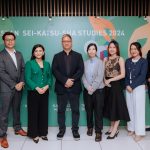From left: Hakuhodo Asia Pacific Executive Regional Strategic Planning Director, Goro Hokari; Hakuhodo Asia Pacific Country Manager Hideaki Sato; Hakuhodo Malaysia Managing Director Ryusuke Oda; Hakuhodo Malaysia Chief Marketing Officer Kota Takaichi; Hakuhodo Malaysia Associate Account Director Kiew Yen Nie; Hakuhodo Malaysia Chief Operating Officer Ryoji Suzuki; and Hakuhodo Inc Corporate Officer Masato Saito and HILL Asia Co Ltd Regional Strategic Planning Director Yusuke Miyabe
Hakuhodo Institute of Life and Living ASEAN announced findings from its latest research into ASEAN sei-katsu-sha in Kuala Lumpur, Malaysia. It was the Thailand-based think-tank’s fifth such presentation.
The institute conducted a comparative study of the impact of new technologies to consumer behavioral changes in six ASEAN countries including Malaysia.
Entitled “THINK FUTURE-FORWARD: ASEAN Lives Evolve As Technology Gets Smarter” the presentation, based upon in-depth qualitative and quantitative researches in Malaysia and 5 other ASEAN markets, revealed the behavioral changes and changes in interactions with brands that will result from new technologies, drawing on independent research, including case studies of extreme users in ASEAN.
The adoption of smartphone in the last decade has dramatically changed the lives of ASEAN sei-katsu-sha. ASEAN is one of the world’s most mobile connected regions.
According to the “Global Digital Report 2018”, We Are Social, January 2018, the per capita penetration of mobile phones in South East Asia is 141%.
In this study, HILL ASEAN analysed the changes of ASEAN lifestyles and their behaviour towards Assistive Media.
The study reveals that people in ASEAN love technology but feel “information fatigue”.
59% of the respondents are familiar with the latest trends in technology and 66% agreed that they always like to try out new products.
However, 70% of them admitted that they spend too much time on their smartphone screen and 48% feel that they are overloaded with information.
It is discovered that 71% of people in ASEAN accept artificial intelligence as beneficial while 4% believe it is a threat. In Malaysia per se, 62% of the respondents agree that artificial intelligence brings more benefits than threats.
The study also reveals that the intention of using the IoT is high but ownership still lags.
On average, 54% of the survey respondents intend to use robot vacuum cleaners; 51% intend to use smart security features; 50% intend to adopt driver assistance systems as well as voice-operated home appliances; and 48% express their intention to own fitness bands with tracking functions.
To prepare for widespread adoption of Assistive Media in the future, companies and brands need to redefine their brand value according to purpose and situation; provide a comprehensive solution not only for things but also the problems of sei-katsu-sha and lastly, personalise messages and timing for each individual.
To view a day in the life of a future ASEAN sei-katsu-sha with Assistive Media, watch video here:
MARKETING Magazine is not responsible for the content of external sites.



